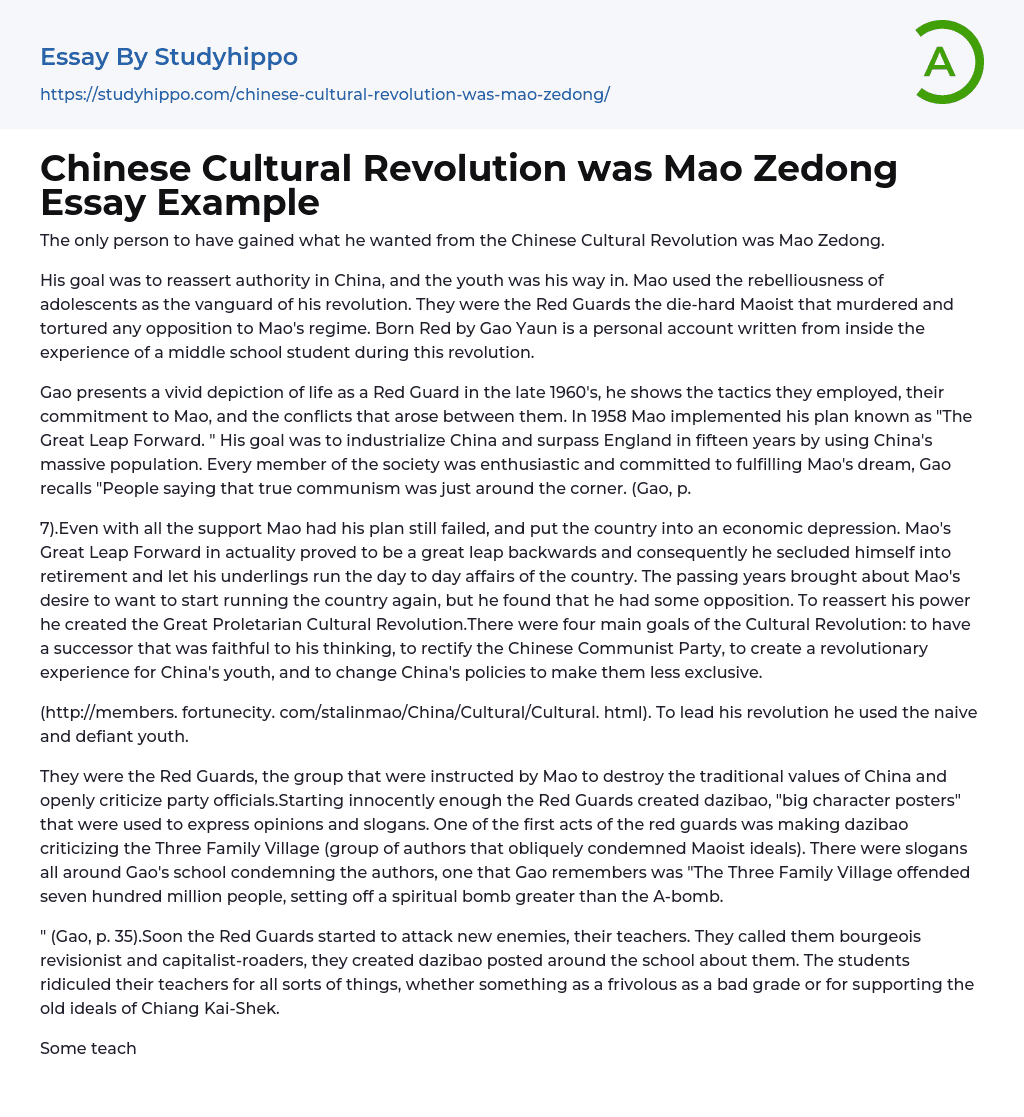The Chinese Cultural Revolution yielded only one individual who achieved their goals, Mao Zedong.
By utilizing the rebelliousness of teenagers, Mao aimed to regain control over China. These adolescents, known as the Red Guards, were at the forefront of his revolution and carried out acts of violence against any dissenters of Mao's regime. Gao Yaun's Born Red provides a firsthand perspective on this tumultuous time, as it is written from the viewpoint of a middle school student.
Gao provides a lively portrayal of the experiences of a Red Guard during the late 1960s, highlighting their tactics, devotion to Mao, and internal strife. Mao's "Great Leap Forward" plan, launched in 1958, aimed to modernize China and eclipse England's economic achievements within 15 years by leveraging the nation's vast population. According to Gao, every individual in society was enthusiastic and dedicated to realizing Mao's vision, with some even predicting th
...at true communism would soon be attained. (Gao, p.)
7). Despite receiving extensive support, Mao's plan failed and thrust the country into an economic depression. The Great Leap Forward, intended to advance progress, ironically resulted in regression. In response, Mao retreated into retirement and delegated daily affairs to his subordinates. However, as time passed, Mao yearned to regain control but encountered opposition. He subsequently initiated the Great Proletarian Cultural Revolution to assert his authority. The Revolution aimed to achieve four objectives: appoint a successor aligned with Mao's ideology, rectify the Chinese Communist Party, provide a revolutionary experience for Chinese youth, and diversify China's policies.
(http://members.fortunecity.com/stalinmao/China/Cultural/Cultural.html). The naive and defiant youth were utilized by him to spearhead his revolution.
The Red Guards, who were instructed by Mao to overthro
the traditional values in China and openly criticize party officials, began their movement by creating "big character posters" known as dazibao to express their opinions and slogans. One of their initial actions was to criticize the Three Family Village, a group of authors who subtly condemned Maoist ideals. As a result, slogans condemning the authors were posted all over Gao's school, including one that he still recalls: "The Three Family Village offended seven hundred million people, setting off a spiritual bomb greater than the A-bomb."
(Gao, p. 35) In a short time, the Red Guards turned on their teachers, labeling them as bourgeois revisionists and capitalist-roaders and even created dazibao to display their disdain. The teachers were ridiculed by the students for various reasons, including poor grades and their loyalty to Chiang Kai-Shek's old ideals.
Some educators couldn't cope with the shame and chose to end their lives in response. Subsequently, the Red Guards conducted Struggle Sessions to question their instructors until they admitted wrongdoing. At this point, the teachers were made to endure public humiliation in front of students while restrained in the "Jet Position," knees down with their arms bound behind their back. The audience would then beat them until they crumpled to the ground. Once they had practiced on educators, the Red Guards applied the same tactics to city officials who were instructed to "eliminate all imaginary enemies."
(Gao, P. 50) According to the text, the Red Guards subjected "corrupt" officials to marches in towns. Additionally, they were assigned to obliterate the old ideas, culture, customs, and habits known as the four olds by Mao.
During the Cultural Revolution, the Red Guards sought to eliminate
all vestiges of pre-revolutionary society through actions such as destroying stores, renaming streets, and demolishing historical monuments. Despite their unwavering faith in Mao's ideology, this led to their eventual demise due to the emergence of class conflicts that fractured the previously cohesive group.
Although the Red Guards were thought to be powerful, in reality, Mao Zedong had complete control over them through his cult of personality. Therefore, they were both perpetrators and victims of the Cultural Revolution, sacrificing their education and being indoctrinated to serve Mao loyally.
Gao acknowledges his remorse for his prior actions and dedicates his book to his son, expressing the desire that future generations will make better choices than he did. In the end, Mao emerged triumphant and regained power over China, but at a heavy cost. Chinese youth were compelled to commit atrocities in pursuit of an unattainable goal.
- African American essays
- African American Culture essays
- American Values essays
- Asian American essays
- Chinese essays
- Ethnicity essays
- Ethnocentrism essays
- German essays
- Han Chinese essays
- Hispanic essays
- Identity essays
- Korean essays
- Mexican essays
- Nation essays
- Native American essays
- Race and Ethnicity essays
- White People essays
- Cuban Missile Crisis essays
- Fidel Castro essays
- French Revolution essays
- Han Dynasty essays
- Hiroshima essays
- Imperialism essays
- Jack The Ripper essays
- Mao Zedong essays
- Middle Ages essays
- Mongols essays
- Nelson Mandela essays
- Ottoman Empire essays
- Reformation essays
- Reign of Terror essays
- Renaissance essays
- Roaring Twenties essays
- Romanticism essays
- Samurai essays
- Scientific Revolution essays
- Soviet Union essays
- Activism essays
- Communism essays
- Conservatism essays
- Liberalism essays
- Marxism essays
- Nationalism essays
- Patriotism essays
- Policy essays
- Public Policy essays
- Social Contract essays
- Socialism essays
- Totalitarianism essays
- 1920S essays




